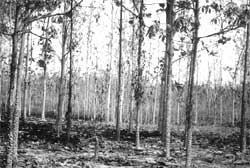Return of the green
 when asked about the motivation behind his endeavours to plant trees and distribute free saplings to the locals, R S Jamir simply replies: "To fill the barren land and make people aware of the importance of trees." The first inspector general of police in Nagaland, now retired, Jamir is at present co-founder of a social forestry organisation called the Luzheto Welfare Society established in 1993. The society's work is restricted to the Luzheto village tucked away in the low-lying plains of Dimapur in Nagaland.
when asked about the motivation behind his endeavours to plant trees and distribute free saplings to the locals, R S Jamir simply replies: "To fill the barren land and make people aware of the importance of trees." The first inspector general of police in Nagaland, now retired, Jamir is at present co-founder of a social forestry organisation called the Luzheto Welfare Society established in 1993. The society's work is restricted to the Luzheto village tucked away in the low-lying plains of Dimapur in Nagaland.
When Hekiye Sema, the other founder of the organisation, passed away in 1998, he left Jamir to supervise the work of the society single-handedly. Jamir's first task was to restore the greenery in and around the Luzheto village which had been stripped bare of trees by indiscriminate felling. The village is home to 100 to 150 Naga families with an average of five persons per household.These villagers - for whom the forest was the main source of livelihood at one time - are at present primarily engaged in agriculture, piggery and poultry farming.
Once covered by thick forests, Luzheto has today become a land of very few shrubs and non-existent wildlife. In this bleak scenario, Jamir started to plant trees of commercial value like gamari , teak, bamboo and agar. He also began to raise awareness among the villagers about the importance of reviving the ecology of the region. In his public meetings, which all the villagers are compelled to attend, Jamir encourages them to take part in the massive plantation schemes in and around the village.
Being a retired igp works to his advantage as the villagers all look up to him. He tells them that there are more cases of bronchial asthma in the cities than in the rural areas due to pollution and lack of greenery. He also emphasises that forests ensure rainfall and the decomposed leaves on the forest floor improve the quality of the soil. The villagers are encouraged to join the society at a meagre annual membership fee of Rs 100 and in return enjoy the economic benefits that flow in once the trees have grown and are ready to be cut down.
Work in progress Since 1993, not less than 500,000 saplings have been distributed annually by the society to the villagers in Luzheto. In 1998 a record 2.5 million saplings were distributed free of cost. Jamir explains to the villagers that once the saplings become trees, the green cover would help check soil erosion, preserve the region's water sources and protect the village from the sun.
The society's efforts are yet to bear fruit and the village has not yet experienced much ecological change. However, the trees are now thriving as they had been well tended in the initial two to three years. Besides, the massive plantation drive has also improved the condition of the soil which was previously parched and extremely dry.
Since the plantation of commercially valuable trees like teak and gamari will not yield immediate benefits, Jamir has advised the villagers to grow bananas, arecanut, coconut and other fruit-bearing trees. This inter-plantations of fruit trees stretch to about4 hectares. The fruits can be sold as well as consumed by the families. Although this is the only immediate economic benefit they get, the villagers expect huge profits within the next 15-20 years. More than 2 million saplings have been planted till 1998 and each tree is expected to fetch at least Rs 1 lakh.
All this work would not have been achieved if the women had not joined forces in the society's programme. Jamir encouraged the womenfolk to take part in the activities of the society. They sold the fruit in the market, while the men collected and prepared them for sale. The women also helped in the fields and planted the saplings. Besides the villagers, Jamir's endeavours have also motivated many high-ranking state officials who now distribute saplings for free in other areas. However, news of the society's work is yet to spread. A 53-year-old farmer in the next village remarks, "I do not know what they are doing, but I have observed the increase in the number of trees in the past 4-5 years."
Related Content
- Compliance report by Jal Shakti (Irrigation and Flood Control) Department, Jammu regarding Tawi barrage project, 04/01/2025
- Order of the National Green Tribunal regarding ammonia gas leakage in a dairy plant, Hajipur, Vaishali district, Bihar, 16/08/2023
- Financing climate-friendly cooling at city scale
- The economic benefits of early green innovation: evidence from the automotive sector
- South Asia economic focus: coping with shocks- migration and the road to resilience
- Beyond water quality: sewage treatment in a circular economy
